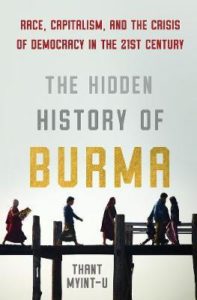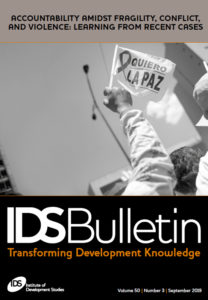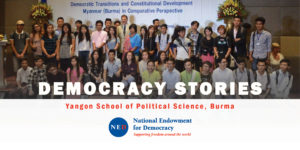 How did Burma’s civilian leader Aung San Suu Kyi go from Nobel Peace Prize laureate to figurehead for a regime accused of genocide?
How did Burma’s civilian leader Aung San Suu Kyi go from Nobel Peace Prize laureate to figurehead for a regime accused of genocide?
After Myanmar’s political reforms in 2011, Western donors rushed into the country in support of what they misunderstood as a remarkable instance of democratization, according to a recent analysis.
In 2019, escalating civil war, ethnic cleansing, and contracting civil liberties suggest the need for a rethink. Viewing transition in Myanmar (aka Burma) through the lens of democratization has always been misleading and problematic, David Brenner and Sarah Schulman write in Myanmar’s Top-Down Transition: Challenges for Civil Society:
Partial liberalization was orchestrated by the military to safeguard its own power. Reforms have not only benefited civil society but also enabled the growth of uncivil society, fueling sectarian violence and bolstering military rule. Operating on the assumption of democratization, Western donors shifted funds from grass-roots networks to militarized state bureaucracies that seek to co-opt peace-building and development projects for the purposes of ethnocratic state-building and counterinsurgency.
 Rethinking the nature of transition is pivotal for preventing inadvertently aiding authoritarianism and conflict, they write for the Institute of Development Studies’ bulletin special issue on Accountability Amidst Fragility, Conflict, and Violence: Learning from Recent Cases, as part of its Action for Empowerment and Accountability initiative.
Rethinking the nature of transition is pivotal for preventing inadvertently aiding authoritarianism and conflict, they write for the Institute of Development Studies’ bulletin special issue on Accountability Amidst Fragility, Conflict, and Violence: Learning from Recent Cases, as part of its Action for Empowerment and Accountability initiative.
Former UN diplomat Thant Myint-U’s book – The Hidden History of Burma: Race, Capitalism, and the Crisis of Democracy in the 21st Century – makes a compelling case for the urgent need for creative thinking that could result in new and effective policy responses to the multiple crises unfolding in Myanmar, according to a Guest Blogger for Asia Unbound and CFR analyst Joshua Kurlantzick.
If Myanmar is to escape its past divisions and overcome the constraints of its colonial legacy, its leaders will have to find a way to enshrine pluralism and tolerance in the national imagination. Thant Myint-U suggests that overcoming economic and social inequalities will be essential to that transformation. But he advances few tangible policy visions for a more equitable society. With the National League for Democracy (NLD) unable to stimulate foreign direct investment and kickstart economic growth, such challenges may be insurmountable for decades to come.
 While the United States and European Union have levied sanctions and trade embargoes against targeted military personnel linked to human rights violations, analysts have been critical of Auung San Suu Kyi’s autocratic leadership style, refusal to decentralize power, and reticence to groom a new generation of political talent. Civil society groups have pointed to the alarming spike in defamation cases brought against journalists and activists under the NLD, which has used the 2013 Telecommunications Law to silence and intimidate critics, note analysts Hunter Marston and Abigail Chen. But one can imagine several ways that an NLD 2.0 could unfold, they write:
While the United States and European Union have levied sanctions and trade embargoes against targeted military personnel linked to human rights violations, analysts have been critical of Auung San Suu Kyi’s autocratic leadership style, refusal to decentralize power, and reticence to groom a new generation of political talent. Civil society groups have pointed to the alarming spike in defamation cases brought against journalists and activists under the NLD, which has used the 2013 Telecommunications Law to silence and intimidate critics, note analysts Hunter Marston and Abigail Chen. But one can imagine several ways that an NLD 2.0 could unfold, they write:
- With a good polling performance, the NLD may find itself empowered to build on its reformist credentials. A weak showing in polling, particularly in ethnic minority areas, may also compel the NLD to swifter actions.
- Second, the first full tenure of the NLD will have illustrated the scale of problems that the party needs to address. ….. The NLD should reflect on the success of former Minister Aung Min, who led the Thein Sein government’s negotiations building up to the Nationwide Ceasefire Agreement with eight ethnic armed organisations in 2015, and the now defunct Myanmar Peace Centre.
- Furthermore, recruiting younger members may infuse the NLD with fresh ideas and has the potential to broaden support for NLD reforms among the young generation, just at a time when the party seriously needs it.







